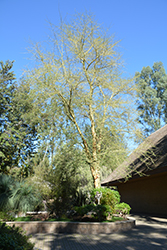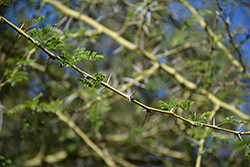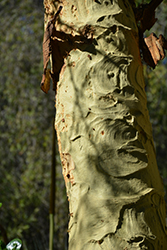It's all about ...
plants

Height: 60 feet
Spread: 50 feet
Sunlight:
![]()
Hardiness Zone: 8b
Other Names: syn. Vachellia xanthophloea
Description:
A semi-deciduous tree with a spreading, umbrella-shaped crown and interesting greenish-yellow bark on spiny branches; feathery, fine textured foliage is dark green; globose gold flowers appear in late winter to spring; drought tolerant once established
Ornamental Features
Fever Tree features showy racemes of fragrant gold ball-shaped flowers at the ends of the branches from late winter to mid spring, which emerge from distinctive pink flower buds. It has attractive dark green deciduous foliage. The tiny glossy narrow bipinnately compound leaves are highly ornamental but do not develop any appreciable fall colour. The fruits are showy brown pods displayed from mid summer to mid fall. The smooth chartreuse bark and buttery yellow branches are extremely showy and add significant winter interest.
Landscape Attributes
Fever Tree is a multi-stemmed deciduous tree with an upright spreading habit of growth. Its relatively fine texture sets it apart from other landscape plants with less refined foliage.
This is a relatively low maintenance tree, and should only be pruned after flowering to avoid removing any of the current season's flowers. It is a good choice for attracting birds, bees and butterflies to your yard, but is not particularly attractive to deer who tend to leave it alone in favor of tastier treats. Gardeners should be aware of the following characteristic(s) that may warrant special consideration;
- Spiny
- Self-Seeding
Fever Tree is recommended for the following landscape applications;
- Accent
- Shade
- Hedges/Screening
Planting & Growing
Fever Tree will grow to be about 60 feet tall at maturity, with a spread of 50 feet. It has a low canopy with a typical clearance of 5 feet from the ground, and should not be planted underneath power lines. It grows at a fast rate, and under ideal conditions can be expected to live for approximately 30 years.
This tree should only be grown in full sunlight. It prefers to grow in average to moist conditions, and shouldn't be allowed to dry out. This plant is capable of fixing its own nitrogen, which means that it is effectively self-fertilizing. As a result it should not require supplemental fertilizing, and if you do fertilize it, be sure to only use a low-nitrogen fertilizer to promote root growth. It is not particular as to soil type or pH, and is able to handle environmental salt. It is highly tolerant of urban pollution and will even thrive in inner city environments. This species is not originally from North America, and parts of it are known to be toxic to humans and animals, so care should be exercised in planting it around children and pets..
This plant is not reliably hardy in our region, and certain restrictions may apply; contact the store for more information.


